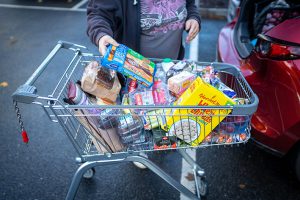Inflation on the weekly supermarket shop has struck a record high in the UK, making it harder for families to put food on the table.
Grocery price inflation hit 14.7% in the past four weeks, the highest level since Kantar started tracking the data in 2008. The jump in prices means the average annual shop is set to rise by £682 ($782) even as consumers contend with rising energy bills as the weather gets colder.
More than a quarter of households said they’re struggling financially, twice as many as a year earlier, and the vast majority said that higher prices on food and softdrink was a major concern. Shoppers were doing their best to save pennies on their groceries, buying own label goods and visiting cheaper supermarket rivals.
“It’s clear just how much grocery inflation is hitting people’s wallets and adding to their domestic worries,†said Fraser McKevitt, head of retail and consumer insight at Kantar. “It’s too early right now to call the top.â€
Supermarkets have brought out more affordable value ranges and Tesco Plc and J Sainsbury Plc are price matching products with cheaper rival Aldi. Sales of the cheapest own-label ranges across all UK grocers are up by 42%.
Still, the discounters are gaining ground as shoppers try to save money. Aldi, which replaced Morrisons as the UK’s fourth-largest supermarket in September, grew its sales by almost 23% in the 12 weeks to late October. Lidl grew by 21.5%. Most other grocers posted single digit growth while Morrisons and Waitrose, the premium chain owned by John Lewis Partnership Plc, saw sales decline.
Sainsbury said last week that profit is falling as it absorbs some of its own surging costs and Tesco lowered the upper range of its profit guidance for the same reason. Grocers are also contending with higher energy and wage bills with most raising employee pay at least once this year.
As a sign of the strain on consumers, fewer people are stocking their cupboards for Christmas. This time last year two million shoppers had bought their Christmas pudding whereas that figure is 32% lower this year, according to Kantar. The number of people using food banks is rising as prices escalate.
“The rocketing price of food is a real concern with millions of people skipping meals or struggling to put healthy meals on the table,†said Sue Davies, head of food policy at Which magazine.
—Bloomberg
 The Gulf Time Newspaper One of the finest business newspapers in the UAE brought to you by our professional writers and editors.
The Gulf Time Newspaper One of the finest business newspapers in the UAE brought to you by our professional writers and editors.
